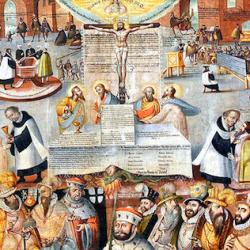The New Testament makes clear that the church is one and should manifest that unity. But given our current state of institutional division, how does one proceed? Especially, how is a local pastor to proceed?
Seven modest suggestions:
1) Start local, stay local. Large-scale ecumenical efforts have born fruit, some healthy, some rotten. Most pastors will never have the opportunity to engage other churches at that level, but that doesn’t mean they can’t advance the unity of the church. Focus attention on your own town or city.
2) Meet the pastors in your immediate vicinity, and cultivate relationships with them. Find 2-3 pastors who are willing to pray together every two weeks, or to pray and study Scripture together. In most cases, you will have much in common, but you will differ on things that are very important to you. Don’t avoid talking about your differences, even if it’s painful. Talk about differences of liturgical and practical practice, as well as doctrinal differences. Be open to learning as much as to teaching. By prayer and before the Word, seek to come to a common mind and confession about the faith.
3) Think beyond existing divisions and boundaries. Don’t assume that the status quo is eternal, that the present is permanent. Look for common ground beyond the barricades, in the Scriptures and the common Christian tradition.
4) Commit to honoring the discipline exercised by other churches, and seek a commitment from other local churches to do the same. Don’t accept members from another church without contacting the pastor of their previous church. This won’t be easy, and it won’t be 100% successful: Some churches may not exercise discipline at all, or may not exercise discipline in a way that conforms to biblical and traditional Christian standards. But you will be able to find some, perhaps many, churches that share a commitment to discipline and to Christian ethical standards.
5) Organize a network of “Nicene Churches of Springfield” among the orthodox churches in your town. Such churches will still have differences of doctrinal commitment and practice, but alongside those differences, the churches will have a public unity of confession. In the main, this will simply make explicit what is already implicit, but the making-explicit is useful.
6) Look for opportunities for common ministry. Go with 2-3 pastor friends to visit the local police station to learn about the needs of your community, and to see how the churches can contribution to a solution.
7) Worship together. Sing together, expressing the sweet harmony of the Spirit. Open the Lord’s table to every baptized believer.
(This is drawn from a lecture on “Protestant and Catholic in Late Modernity,” delivered at Covenant Seminary, St. Louis, March 6, 2015.)











